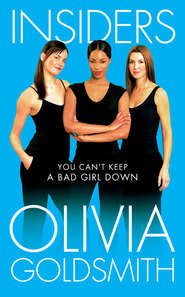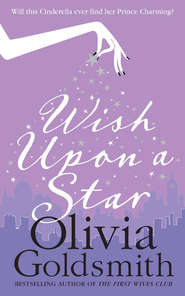По всем вопросам обращайтесь на: info@litportal.ru
(©) 2003-2025.
✖
The Switch
Автор
Год написания книги
2018
Настройки чтения
Размер шрифта
Высота строк
Поля
Sylvie turned to look at the scene behind her. Three nectarines and a head of lettuce were now floating on the top of the pool. The car glinted up from the bottom like a silver fish lying under aspic. What had she done? And why had she done it? She put her hand up to her eyes to wipe away the water streaming down from her hair, only to realize there were also tears rising over her bottom lids. What had she done? Was she crazy? “I just want Bob to notice me,” she admitted in a whisper.
Mildred nodded, then opened the door to the outdoor cabinet that Bob had always laughingly called “The Cabana.” Oh, he was a card, Bob was. Sylvie shivered in the cool autumn air as she watched her mother take out two faded beach towels. “Sylvie, sweetheart,” Mildred said, “men don’t notice their wives. A new blonde in the neighborhood, yes. A sports car, absolutely. But after forty-six years of marriage, just ask your father what color eyes I have.” Mildred looked deep into her daughter’s own eyes. “Give it up, Sylvie.” Mildred wrapped one of the towels around Sylvie’s shoulders and handed her the other one. “For your hair,” Mildred directed. Rosalie had thrown her left leg over the fence. “What can I do?” she hollered.
Exasperated, Mildred raised her own voice. “You can move out of the neighborhood, Rosalie. You’ve been divorced from my son for three years.” Rosalie had almost managed to breach the fence. Sylvie knew Rosalie was lonely since the divorce and with her kids away, but though she tried to feel for her, Rose was shameless in her interfering with the family. She wouldn’t sell her house or leave the culde-sac; she wouldn’t stop snooping and gossiping and showing up uninvited. After her settlement from Phil had left him broke, she still insisted he had secret funds. And that everyone was better off and had more resources than Rosalie.
Now Rosalie the Resourceful got her right leg over the fence and jumped into the yard.
Rosalie made a beeline for the pool and stared into it. “Holy shit! I heard it but I didn’t see it.” She squatted down, looked at the car, and grinned. “Is this gonna be covered by the warranty?” she asked. She reached out and grabbed the lettuce, floating near the edge of the pool coping, and brought it over to Sylvie. “God, you’re a mess,” Rosalie said as she surveyed Sylvie, who was dripping like a defrosting freezer. Rosalie held up the lettuce. “Salad, anyone?” Mildred snatched it from her. “What’s happened to you, Sylvie?” Rosalie asked. “I mean, aside from the dunk? I couldn’t see you in the dark last night, but you look awful. You looked so much better the other day when I saw you with Bob leaving Vico’s. He was driving pretty fast but I could have sworn you’d lost weight. I thought you’d lost weight,” Rosalie said doubtfully, looking at the wet clothes clinging to her sister-in-law.
“I wasn’t with Bob in his car the other day,” Sylvie said. “He moves too fast.”
“He was putting the moves on you, all right.”
“Go home, you loon,” Mildred snapped and began propelling Sylvie away from the scene of the crime. Sylvie knew Mildred felt sorry for Rosalie, just like she did, but still, the woman was brash and insensitive. That’s why she’d been such a perfect match for Phil, and it had broken Mildred’s heart when they split up.
“I wasn’t in Beautiful Baby,” Sylvie called over her shoulder. Did all of Cleveland spend its free time sighting her in places she wasn’t? Next she’d be seen with Elvis.
“You’ll have to continue this little chat later.” Mildred turned her back on Rosalie and guided Sylvie gently but firmly into the house to the music room. She locked the French doors behind them and sat Sylvie down on the bench.
Rosalie, outside, tried the door handle.
“I haven’t ridden in Bob’s convertible in years. I’m not totally crazy,” Sylvie told her mother.
“Evidence to the contrary,” Mildred said, and took the towel from around Sylvie’s head. “You need a touch-up at the roots,” she added.
“I’m letting them gray and grow in,” Sylvie said.
“Then you are crazy,” Mildred told her daughter.
“Why? Bob didn’t even notice when I changed the color.”
“Well, he’ll notice this,” Mildred predicted, looking at the pool.
“My god. How will I tell him?” Sylvie felt her stomach lurch.
There was a banging on the window. Rosalie was pointing to the door lock. “As if,” Mildred sniffed. Sylvie looked at the poor locked-out woman. But she just couldn’t cope. She needed comforting now, and some calmness. Rosalie was too self-involved to offer that. For some reason, imagining Rosalie alone in her house next door made Sylvie lonely herself. Well, she realized, she was lonely. Even with her mother here beside her. She gestured for Rosalie to go away. Rosalie paid no attention.
“Maybe I am nuts,” Sylvie said, and nearly sobbed. “It’s pathetic to be so hurt because your husband is ignoring you. I just can’t figure out if he always did and I didn’t notice because the kids were around or if he’s ignoring me in a whole new way.”
“Oh, Sylvie,” Mildred sighed. “This is all so normal and predictable. I did the car thing too, back when your father was still running the lot. Maybe not as dramatically, but every time we had a big fight, I’d rear-end somebody.”
“You did? What did you tell him?”
“That the brakes failed, and that’s back when they were still calling it ‘the ultimate driving machine.’”
“So it’s hereditary?” Sylvie asked. “Being crazy?”
“From your father’s side.”
Rosalie began rattling the door. Mildred turned and surveyed her. “Isn’t it strange? She seems to think it’s accidental that she’s excluded,” Mildred observed to Sylvie. “Just remember,” she added, “I didn’t like her while she was married to Phil.” She turned her full attention back to Sylvie. “But I admit my son unhinged her. Poor thing. She’s crazy by marriage.” Mildred sighed. “Phil could make any woman nuts. Not like Bob.”
Sylvie felt the towel between her and the bench turning sodden and stood up.
“We better go upstairs,” Mildred told Sylvie. “If she can’t see or hear us, Rosalie will get tired and go home and the neighbors won’t hear her banging to get in. Otherwise this will be all over town by dinner.” Sylvie nodded, though it would be all over town by dinner anyway. Mother and daughter moved together from the brightness of the music room into the darkness of the hall. Mildred sighed deeply as she shepherded her daughter up the stairs. “Maybe the family business made all the rest of us crazy. But I thought you and Bob were immune.”
They got to the landing, where a picture from Reenie and Kenny’s tenth birthday party hung. Bob had been dressed up as a bagel, the twins’ favorite treat at the time. “Remember how much fun Bob used to be?” Sylvie asked.
“Fun? No. Intense, yes. Fun, no.”
“Yes you do,” Sylvie urged. “He was such a great dancer. And he was always playing the piano.” She lowered her voice. “The music in him has died.”
Mildred gave her a little push and propelled her up the rest of the stairs, still carrying the head of lettuce. “Oh, please, Sylvie! Those artistic dreams always die. There’s not a chiropractor in Shaker Heights who didn’t think, at one time, he had a novel in him.”
Sylvie shook her head, unutterably sad. They entered the bedroom. It was all so pleasant—the bed had an antique headboard she and Bob had bought and refinished together years ago. She’d found the chest of drawers at a Cleveland thrift shop and had painted and decoupaged it. The quilt had been her grandmother’s. It was a room with a lot of history. So why did she feel so desolate? Sylvie stood there and dripped on the floor. Mildred unbuttoned the back of Sylvie’s blouse and began helping Sylvie off with her wet clothes. Sylvie felt absolutely limp.
“I don’t know. I thought after the kids went off to college that …”
“… the two of you would … yeah, yeah, go on cruise vacations, dance until midnight.” Mildred pulled at the wet blouse, dragging it over her daughter’s head, then caressing her wet hair. “Just like your father and me,” she said. She shook her head. The gesture made Sylvie feel somehow bereft. “Where you got the idea that marriage was supposed to be romantic is beyond me,” Mildred said. “You certainly didn’t get it in my house.” Sylvie knew her mother was trying to cheer her up, but jokes were no comfort—if Mildred was joking.
Mildred turned Sylvie around to look at her. “Listen to me: you want excitement? You want affection and devotion and some nights out in the spotlight?”
Sylvie nodded her head.
Mildred brushed her hand tenderly across her daughter’s cheek. “Then take my advice: raise show dogs.”
4 (#ulink_6b7b5ca0-4d51-5437-8e6a-d64e81370cfb)
Sylvie sliced the rescued head of iceberg lettuce into four quarters and then took two of them and halved them again. She wondered if being submerged in the pool had poisoned the stuff. She’d removed the outer leaves and then washed the lettuce for almost ten minutes. Was it enough? Sylvie shrugged. What the hell. If chlorine in the pool didn’t kill you when you got a mouthful of pool water, she supposed it wouldn’t kill her husband when it was spread on a vegetable.
Bob had come home while she was showering. She’d come downstairs, neatly dressed and her hair freshly blown dry, but he had been on the phone in the dining room. For that she was grateful, because it gave her a few moments to prepare for her confession. When moment stretched into a tense half an hour, she went into the hallway looking for him, only to hear the shower running upstairs. She shrugged and began preparing dinner, mentally rehearsing what she could possibly say.
She looked at the lettuce. She didn’t care for it, not really, but no matter how hard she tried, Bob had never graduated from iceberg to mesclun greens or even Bibb. Sylvie reached for the balsamic vinegar in the cupboard on the right. She was almost out and took a moment to jot that down on her grocery list. Then she glanced out the window at the pool. Because the kitchen was slightly above ground level she could just look into it and see the BMW’s right fender and part of the trunk. God! She was nuts. Well, she’d done what she’d done. Bob would probably kill her, and she probably deserved it. She was a whining, spoiled, ungrateful woman. He, on the other hand, was an excessively clean man. At last she heard Bob coming down the stairs and, on an impulse, she flipped on the pool light. He entered the kitchen, sat down at his place at the table, and picked up the glass of white wine she had already poured him.
It was funny, Sylvie thought, how she could do some things automatically. How, despite this sense of everything being askew, she could manage to pull the salmon steaks out of the broiler and nestle them on the plates next to the broccoli. She looked at Bob, sitting there clean and damp, sipping his wine and going through the mail, seemingly calm and content. Her heart swelled. He was still so handsome. What was her problem? Maybe he didn’t notice her, maybe he did take her for granted, but he was a good husband, a great father, a good provider. He loved her. She glanced out the window again at the illuminated pool. She restrained a shudder and put the dinner plate in front of her husband, sitting down opposite him.
“Mom wants to know if you’d like to come to a birthday dinner at their house.”
Bob had picked up his fork and speared a piece of the salmon. He looked across the table at her. “Whatever you want,” he said, his mouth full of fish. He went back to the mail.
Sylvie stared at the top of her husband’s bent head. You could live with someone for two decades, sleep with them, do their laundry, bear their children, and then look up one moment and see them not as a perfect stranger but as a very, very imperfect one. For a moment Sylvie stopped regretting that she had driven the car underwater and wished instead she had driven it over her husband. Out of nowhere that same feeling of rage hit her again. Why?
Well, she thought, for one thing, for her birthdays had always been special. They were a day to rejoice. For Bob’s birthday she always made his favorite dinner: pot roast, potatoes, and red cabbage, even though the stink of the cabbage always made her queasy and hung in the air for days after. He liked angel food cake and she’d never failed to make one for him. She always had at least one funny gift, and one he really wanted. For the twins’ birthdays, every year, she’d made their favorite foods—and because Kenny loved fish sticks and Reenie liked glazed ham she had to serve two dinners. She’d never failed to bake her special angel food cake. She’d worried over gifts. She’d written (and saved) birthday poems every year, taken pictures of each event and put them in the special birthday album she had. Photos of all of them, on each birthday for nineteen years. Why was it only now she realized she wasn’t in the book on her birthdays?
But, she reminded herself, men knew nothing about celebrations and gifts, though she’d tried to teach Bob. On the first birthday she had spent with him, when they’d been married less than five months, he’d given her a toaster oven. Sylvie had opened the package, laughed, and then waited for her real gift. The oven, though, had been her real gift. She hadn’t spoken to him for almost two days and then, in an explosion of tears and anger, had had to explain that she wanted something personal, something romantic and meaningful, as a gift between them. He’d never made an error as egregious as the toaster oven again, but he’d still never quite gotten it about gifts and birthdays. Sylvie didn’t like to feel selfish or ungrateful, but she had to believe that twenty years of training could yield something more insightful, more meaningful, more imaginative than a car she didn’t want and a shrug of his shoulders for her fortieth birthday.
But maybe she was wrong. Maybe all he was trying to do was make her happy and doing it in the best way he knew how. The convertible—nothing she cared about and nothing she needed or wanted—might, to Bob, be the equivalent of an emerald ring with a loving engraving within. Might. Just possibly.
Sylvie looked across the table. “Bob, I did something terrible today.”











